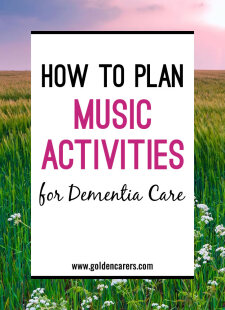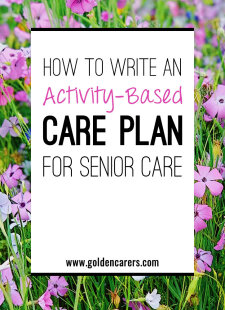Shared By
Haley
 Recreation Therapist And Writer
Recreation Therapist And Writer
 Recreation Therapist And Writer
Recreation Therapist And Writer
How to Overcome Common Dementia Challenges in Group Activities

18
0
16
115
View this page and thousands more!
Join Golden Carers for Unlimited Access
Join Now $59.99 USD/yr
“Thank you Golden Carers for always inspiring me with interesting topics. Keep them coming!”
Marjorie Luker, Activities Assistant
Comments
18
to comment






Hi Zeba
Do any of the organizations you are associated with have a hospice group because they often have a simple dementia courseThat they offer for free
The Alzheimer’s Association also has some for free
https://training.alz.org/
Hi
Thank you for the insight.
Is there any online free course on Dementia?
I am very much interested in doing.
Please let me know.
Thank you.
Zeba
Seniors Program Coordinator
There is an online course offered by the University of Tasmani that gets very good reviews:
https://www.utas.edu.au/wicking/understanding-dementia
Thank you for the great ideas! I have a resident in memory care who screams at other residents and staff when she is talking to them, and says things like “you’re an idiot I don’t understand you, I said I want Diet Coke!! She will scream to other residents to sit down, stop talking, she’s not playing the game right! I have talked to her about using an inside voice, instead of screaming. The care staff doesn’t know how to interact with her, and they get frustrated. Any ideas on how to handle her ??? Thank you!
Hi Vicki
I think this article may help you
It gives us many good ideas
Also read the comments
https://www.goldencarers.com/how-to-respond-to-challenging-behavior/3847/
Hi Virginia
Thanks for sharing this and the good outcome you got
Hi Virginia
Thank you for sharing this information
Another thing I did when the residents were being unkind is that I would have a kindness activity and will talk about what that means to be kind
They seem to help for a while anyway
https://www.goldencarers.com/comments/19368/
We have been experiencing a lot of residents lashing out at those w/ cognitive decline in groups. W/in my facility, there are more residents w/ Alzheimers/dementia than without and it can make the individuals who are w/o cognitive decline frustrated at the pace in which group progresses and the repetitive nature. Some of these residents can become particularly hateful/hurtful. Rather than call individual residents out, we have enacted a "No Bullying Rule" in activities and we go over it at the beginning of every activity. My team and I thought this may be the best way to address the behavior w/o calling specific residents out in front of the group. If a resident does say something hurtful/inappropriate after the rules have been stated, we try to redirect them and remind them of why Activities are inclusive to all, but it has been difficult. Do you have any tips for residents who are completely AAO and still extremely hurtful, regardless of going over the rules at the beginning of each group. The last thing we want to do is to have to remove a resident from group but we also want to maintain the dignity of the other residents present.
Hi Jordan, I had a similar experience with residents being hurtful to others in the group. I then started a group for the alert & oriented with a weekly topic usually about what Alzheimer's and dementia are and what the reality is for those who have this diagnosis. Education on a topic they may not understand can be most helpful. This helped them have more tolerance for those who could not keep up or slowed down the group. They actually started helping with the groups.
Hi Jordan, this problem is common in care facilities and unfortunately, there is no widespread protocol to deal with it as yet. In some facilities management gets involved and sets up specific guidelines and procedures for reporting resident-to-resident mistreatment. It is important to understand the contributing factors. Have you tried to match the person with mind-like residents in a separate group? Also, observe the resident and praise him/her enthusiastically when you see her doing something nice to another person. Behavior-specific praise is powerful; praise and thanks to the person for what he/she did right. Another strategy is to appeal to her empathetic feelings to ‘help’ you to run a craft/social group session. If everything fails, involve the management. Good luck!
Hi Jordan
Yes this can be difficult if you are mixing all types of residents
Have you tried the suggestions in this article
I like Pairing the residents
Also what I did is to do a one to one interaction within the group
That way you can make what you are doing more appropriate to each person
I’d like to do a musical activity because that’s pretty inclusiveThese articles may help you also
https://www.goldencarers.com/8-ways-to-to-encourage-friendships-among-residents/6692/
https://www.goldencarers.com/laughing-together---five-activities-to-get-residents-smiling-/5430/
https://www.goldencarers.com/how-to-create-a-culture-of-happiness/5055/
I absolutely agree that it's about the inclusive experience and sense of achievement and not the finished product ... Thank you for this great site
Thanks heaps and salute to all who did these things for us..i love every single activities and information.
Thanks so much for your feedback Mayflor x
Hi Diane
I agree it’s not the finished product it is the experience or the process
Thank you
This is helpful! Thank you!
I LOVE #1 - it's not about the finished product, it's about the experience - YES!
Thanks for the insight into disruptive residents during group activities
You state to have instructions written down and placed near the resident as a source for them to return to gain directions to complete the task at hand
This method is ideal if the resident is still capable of reading